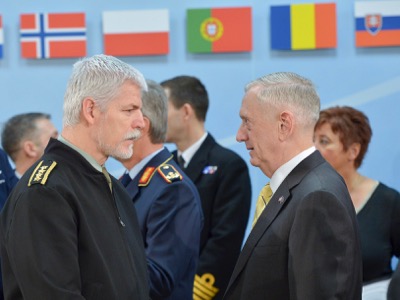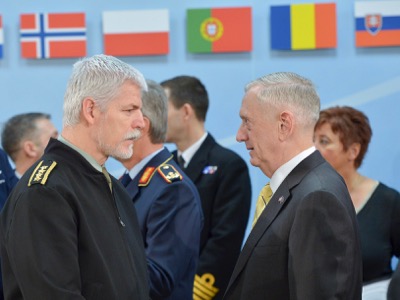Nato is not “obsolete”. Working with Mattis, it is clearing the ground for more wars
Eagerly awaited in Brussels, the Trump Administration’s new Secretary of Defense has emphasised that henceforth, Washington intends to rely on the Alliance and will desist from collecting from its members their signatures at the bottom of its declarations of war. At the same time, an increase in military expenditure should follow, embedded in which are the risks of war and a rebalancing of the political forces in the Alliance. However, the Pentagon is still looking out to maintain its pre-eminence over its Allies.

- General Mattis engaged in discussion with the Chair of Nato’s Military Committee, the Czech General Petr Pavel.
At the meeting of the North Atlantic Council that kicked off yesterday in Brussels, Minister Pinotti and the other European Defense Ministers exhaled a long sigh of relief: Nato is not, as President Trump had said, “obsolete”. In his first official declaration at Brussels, the new US Defence Secretary, Jim Mattis, pledged that Nato is still “the fundamental base of the United States”.
It is the “most successful military alliance in history”, he told journalists while flying to Brussels. The US commitment to the Alliance is evidenced by the fact that the only Nato command headquartered in the United States is the Supreme Allied Commander for Transformation (Sact), a role that Mattis himself has already taken on. Sact, responsible for the Military Committee (the highest military authority in Nato), “promotes and controls the perpetual transformation of the Alliance’s forces and capabilities”. Over the last 20 years, Mattis emphasized, Nato has been transformed (indeed, it has swallowed up every single country of the former Warsaw Pact, three from the former USSR and three from the former Yugoslavia). Yet “it must continue to keep reinventing itself to accommodate the events of 2014, the year of change, when it became clear that our hopes of some sort of partnership with Russia would yield no fruit”. To do this, we need “to be sure that our transatlantic link remains robust”. To prove the point, the Nato Secretary General, Stoltenberg made a joint declaration with Secretary Mattis yesterday, confirming that “US troops and equipment are arriving in Poland and the Baltic states, a clear indication that the United States is determined to stand side by side Europe in these troubled times”.
And so, under US command (which is responsible for appointing the Supreme Allied Command in Europe), Nato continues to inject further power to the forces lined up on the Eastern border, with anti-Russian intentions in mind. And this is so despite President Trump’s declared intentions to strike some sort of deal with Moscow. At the same time, Nato empowers the southern border by [deploying] new military apparatus there. “Today we will decide to establish a new Hub for the South at our Joint Forces Command at Naples” announced Stoltenberg, emphasizing that “this will allow us to evaluate and confront the threats emanating from this region to complement the work carried out by our new Division of Intelligence established here at the Nato headquarters.”
Much to the satisfaction of Minister Pinotti, Italy’s profile is raised. And it is in Italy where Stoltenberg, opening the North Atlantic Council, defined “projecting stability that reaches beyond our borders”. The new “Hub for the South”, which will be built at Naples will comprise the operational base for launching land, air and naval forces in a “region” whose borders are not clearly drawn up, including North Africa and the Middle East but also reaching areas beyond these. The Nato “Response Force”, is available for such operations and noteworthy is the increase to the “Very High Readiness Spearhead Force” to 40,000 men. This can be launched in 48 hours “anywhere, at any time”. The new “Hub for the South”, built at the Command for Joint Allied Forces headquartered at Lake Patria (Naples), will be headed by the US Admiral Michelle Howard who has nerves of steel and who, in addition to heading the Nato Command, is the commander of the US Naval forces for Europe and the US Naval forces for Africa. Therefore the new “Hub for the South “ will fall within the Pentagon’s chain of command. All this has its price. Mattis has confirmed the non-negotiable “invitation” that “defense” expenditure should be spread among all the European allies and each one should contribute, at the very least, 2% of the GDP. Only five Nato countries have reached or surpassed this level: the United States (3.6%), Greece, Great Britain, Estonia and Poland. Italy lags behind with “barely” 1.1% of the GDP, but it is making progress: according to official Nato statistics, in 2015-2016, the amount Italy spent on “defence” leapt from 17,642 to 19,980 million euro. This translates to about 55 million euro per day. Of course, actual military expenditure is far higher, given that the “defence” balance sheet does not include military missions abroad, funded with a specific fund at the Ministry of Economy and Finance, nor the cost of important weaponry, also funded by the Stability Law. Stoltenberg, delighted, announces that at long last, Nato “had turned the page”, increasing military expenditure in 2015-2016 by 3.8% in real terms, that is, around 10 billion dollars. Minister Pinotti is confident that Italy will reach the 2% minimum target (that is, that Italy will spend 100 million euro every day on “defence”). While unemployment will increase, we will have the satisfaction of having a new “Hub for the South” at Naples.
Translation
Anoosha Boralessa
Anoosha Boralessa
Source
Il Manifesto (Italy)
Il Manifesto (Italy)
La OTAN no «obsoleta» se prepara con Mattis para otras guerras
Muy esperado en la sede la OTAN, el nuevo secretario de Defensa de la administración Trump subrayó la intención de Washington de apoyarse en la alianza atlántica, en vez de limitarse a lograr que sus miembros aprueben sus declaraciones de guerra. Esto debería implicar tanto un aumento de los gastos militares –con los peligros de guerra que ello implica– como un reequilibrio de las fuerzas políticas en el seno de la OTAN. Sin embargo, el Pentágono no piensa renunciar su posición de preeminencia en relación con sus aliados.

- El general Mattis conversa con el general checo Petr Pavel, presidente del Comité Militar de la OTAN.
La ministra de Defensa de Italia, Roberta Pinotti, y los demás ministros europeos de Defensa respiraron aliviados en la reunión del Consejo del Atlántico Norte, iniciada el 15 de febrero en Bruselas: la OTAN no está «obsoleta», como había dicho el presidente Trump. En su primera intervención oficial en Bruselas, el nuevo secretario de Defensa, James Mattis, aseguró que para Estados Unidos la OTAN sigue siendo «fundamental».
Es «la alianza militar más exitosa de la Historia», dijo Mattis a los periodistas en el avión que lo llevaba a Bruselas, y como prueba del compromiso estadounidense con la alianza atlántica mencionó el hecho que el único mando de la OTAN con cuartel general en Estados Unidos es el Comandante Supremo Aliado para la Transformación (SACT, siglas en inglés), cargo que el propio Mattis ocupó en su momento. El SACT, responsable del Comité Militar –la más alta autoridad militar de la OTAN–, «promueve y controla la transformación continua de las fuerzas y capacidades de la alianza».
Mattis subrayó que la OTAN se ha transformado en los últimos 20 años –en efecto, incorporó a todos los países del extinto Pacto de Varsovia, así como 3 Repúblicas de la desaparecida URSS y otras 3 de la ex Yugoslavia. Pero, agregó, «debe seguir transformándose para adaptarse a lo que sucedió en 2014, año del viraje en el que nuestras esperanzas de alguna forma de asociación con Rusia resultaron infructuosas». Y para eso hay que «estar seguros de que el vínculo transatlántico se mantenga fuerte».
Para demostrar esto último, el secretario general de la OTAN, Stoltenberg, confirmó en su declaración conjunta con el secretario Mattis que «tropas y equipamiento estadounidenses están llegando a Polonia y los países bálticos, mostrando claramente la determinación de Estados Unidos a mantenerse junto a Europa en este periodo tormentoso».
Bajo el mando de Estados Unidos –país al que pertenece el cargo de Comandante Supremo de las fuerzas aliadas en Europa–, la OTAN sigue extendiéndose hacia el este y reforzando su despliegue en el frente oriental con visos anti-rusos, a pesar de las intenciones declaradas por el presidente Trump de abrir una negociación con Moscú. Al mismo tiempo, la OTAN refuerza también el frente sur con nuevos dispositivos militares.
«Hoy decidiremos conformar un nuevo polo para el sur en nuestro Mando Conjunto en Nápoles», anunció Stoltenberg, subrayando que «eso nos permitirá evaluar y enfrentar las amenazas provenientes de la región, como complemento del trabajo realizado por nuestra nueva división de Inteligencia, conformada aquí en el cuartel general de la OTAN».
Para la mayor satisfacción de la ministra Pinotti, la importancia de Italia aumenta en el sentido de lo que Stoltenberg definió en la apertura del Consejo del Atlántico Norte como «proyección de estabilidad más allá de nuestras fronteras». El nuevo «Hub para el sur» que se instalará en Nápoles, servirá de base operativa para la proyección de fuerzas terrestres, aéreas y navales hacia una «región» de contornos indefinidos, que abarca el norte de África y el Medio Oriente así como áreas más allá de esas regiones geográficas. Para ese tipo de operaciones está disponible la «Fuerza de Respuesta» de la OTAN, con un incremento de 40 000 efectivos, principalmente su «Fuerza de Avanzada de Muy Alta Rapidez Operativa», que puede proyectarse en 48 horas «hacia cualquier lugar y en cualquier momento».
El nuevo «Hub para el sur», dependiente del Mando de la Fuerza Conjunta Aliada –cuyo cuartel general está en Lago Patria, Nápoles–, estará bajo las órdenes de la aguerrida almirante estadounidense Michelle Howard, quien, además de estar a la cabeza de Mando de la OTAN, es también comandante de las fuerzas navales de Estados Unidos en Europa y en África. O sea, el nuevo «Hub para el sur» también será parte de la cadena de mando del Pentágono.
Y todo eso cuesta dinero. Mattis recordó el pedido perentorio a todos los aliados europeos para que eleven el gasto destinado a la «defensa» hasta al menos un 2% de su PIB. Hasta ahora, sólo 5 países han alcanzado o sobrepasado ese nivel: Estados Unidos (3,6%), Grecia, Gran Bretaña, Estonia y Polonia. Italia está detrás con «a penas» un 1,1% de su PIB… pero está mejorando: según los datos oficiales de la OTAN, en 2015-2016 el gasto de Italia en la «defensa» aumentó en 17 642 millones de euros a 19 980 millones, lo cual representa un promedio de 55 millones de euros gastados cada día en el sector militar.
De hecho, los gastos militares de Italia están muy por encima de esa cifra ya que el balance de la «defensa» no incluye las misiones militares en el exterior –costeadas por un fondo aparte del ministerio de Economía y Finanzas–, ni el costo de importantes armamentos que se pagan a través de la Ley de Estabilidad.
Pero Stoltenberg anuncia muy feliz que la OTAN «ha pasado una página» en 2015-2016 al aumentar el gasto militar en un 3,8% en términos reales, o sea en unos 10 000 millones de dólares. La ministra Pinotti confía en que Italia alcance el famoso 2% del PIB, o sea en el país llegue a gastar 100 millones de euros diarios en el sector de la «defensa».
Y crecerá el desempleo, pero tendremos la satisfacción de tener en Nápoles el nuevo «Hub para el sur»
Fuente
Il Manifesto (Italia)
Il Manifesto (Italia)








No comments:
Post a Comment